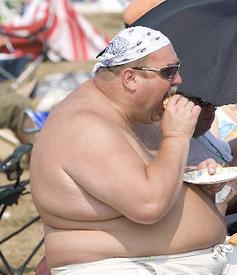Understanding Why it's So Difficult to Maintain Weight
Replies
-
I found this video very interesting; however, they mentioned her diet to lose weight while in the center consisted of 800 liquid calories... Please do correct me if I'm wrong, but I thought anything below 1,200 calories per day was unhealthy, especially for nine months? I wonder if that could have influenced the results at all, if maybe this was also the result of her body sort of going into shock? I would be interested in the results from a group of individuals losing weight on a less restrictive diet for a longer period of time. Thanks for sharing this with us!
 1
1 -
Bump0
-
Definitely worth watching.
Like another poster, I too was surprised to hear the subject was on 800 calorie liquid diet for months which seems a bit low. But then, that's what Medifast does, and apparently there are lots of people on the program.
There is another issue that I have with the experiment. The subjects were kept in a controlled environment and fed liquid diet for months - is it any wonder they had trouble maintaining after they were released?0 -
it's on youtube.
 http://www.youtube.com/watch?v=-pEkCbqN4uo 0
http://www.youtube.com/watch?v=-pEkCbqN4uo 0 -
As mentioned in the segment, your TDEE will recover somewhat but, once it is capped, it may be less than someone with comparable stats who maintains naturally at that weight. Generally, the larger the deficit which is maintained, chronically, the greater the decline in energy expenditure when weight recovery is complete.This is a good series and well worth a watch for those interested.
Does anyone know if TDEE readjusts back up in time? For example, if, after I complete my weight loss, my TDEE is 15% lower than expected, will it go back up after months or years at maintenance?
One could increase TDEE by increasing lean mass, body weight and activity, though.
Semi-starvation diets are the protocol in such studies due to the prevalence of morbid obesity and the fact that VLCD are commonly prescribed in interventions among this population. Some studies, however, will provide varying calorie allotments among chosen groups to further investigate the effects of calorie restriction at different degrees. With that said, findings consistently demonstrate that larger deficits generally lead to greater adaptations among subjects in terms of difference in energy expenditure and thyroid hormone levels and function.I found this video very interesting; however, they mentioned her diet to lose weight while in the center consisted of 800 liquid calories... Please do correct me if I'm wrong, but I thought anything below 1,200 calories per day was unhealthy, especially for nine months? I wonder if that could have influenced the results at all, if maybe this was also the result of her body sort of going into shock? I would be interested in the results from a group of individuals losing weight on a less restrictive diet for a longer period of time. Thanks for sharing this with us! 0
0 -
I've pretty much made up my mind that I will have to log what I eat into my diary and exercise frequently for the rest of my life--even after I have reached my goal weight.
I've reached my goal weight a few times in my lifetime and gained all the weight back (and some) each time. I'm convinced I gained it back because I didn't want to keep track any more.
^^^THIS^^^
I fully intend to "diet" after I reach my goal—I'll just have a different calorie total. I'm still going to track everything and weigh myself often. The key to maintenance is course-correcting before a problem becomes a problem.0 -
bumping0
-
I didn't watch the video. I personally think it's easier to maintain than it is to lose. I've been maintaining for over two years now and it's really simple. I've got my good habits in place, it only takes a few minutes a day to track my exercise and calories and I'm good to go. My weight just stays the same, almost like magic except that it's not - it's just MFP and habit. (It might go up or down by 1-2 pounds during a certain time of the month, or if I'm sick, but otherwise, it's pretty much been a constant.) :flowerforyou:
do you still track calories every day then? That's just mind boggling to me-I got burned out from tracking just during the few months of weight loss and stopped when I started transitioning into maintenance I wonder if I'm setting myself up for failure by not tracking them?
I wonder if I'm setting myself up for failure by not tracking them?
Yes! I still track. Every once in a while I take a day or two off - like if it's a holiday or I'm out backpacking in the wilderness. I eat a lot of the same things so it's all there in my frequent foods list. It really only takes me a few clicks and a few minutes a day (like brushing my teeth, taking a shower, washing the dishes) and it's totally worth it. It really works! :happy:0 -
Fascinating. I'm going to watch the full series now... there goes my weekend!
 0
0 -
Bumping for later0
-
Saving this for later, when I will get to the maintenance.0
-
so far, for me, i have enjoyed maintenance. i can eat up to 2000 cals a day, and not gain, and even lose a small amount. maybe i could even eat more on average, i have not tried. i have had no struggles with initial weight gain after transitioning to maintenance. 2000 cals a day is what a average woman should be able to eat. i dont believe that i will have a harder time maintaining than those who were never fat. i believe its a mind set. those who were never fat, more than likely never had a problem with food, therefore, they dont have a problem with maintaining their weight. those who have been obese, obviously have a problem with food / being lazy, and have issues with falling back into old habits after they lose, thus causing weight gain after loss. im not worried, for me, its the beer... i just have to watch the beer... those beer calories will get me!
 0
0 -
I myself am not on maintaining yet but I have successfully lost in the past. I didnt track and before long i was back to where I started from. I feel tracking is the key that i was missing0
-
I still track as I love overeating. Even with tracking I've just emerged from a two month derail.
The other issue is that I recently thought about this - I can't speak for everyone but often our goal weights are lower than our bodies' natural set points so it's a struggle to maintain.0 -
I found this video very interesting; however, they mentioned her diet to lose weight while in the center consisted of 800 liquid calories... Please do correct me if I'm wrong, but I thought anything below 1,200 calories per day was unhealthy, especially for nine months? I wonder if that could have influenced the results at all, if maybe this was also the result of her body sort of going into shock? I would be interested in the results from a group of individuals losing weight on a less restrictive diet for a longer period of time. Thanks for sharing this with us!

That's a good point, but I think it said the weight loss phase of the study was only 4-6 weeks out of the 9 month period. It also sounded like the subjects had a lot of support from the doctors and nutritionists in terms of education and counseling to help them maintain the loss. I think it is valid to consider extrapolating the results outside the lab and VLCD due to the fact that whether weight is lost quickly or slowly has not been shown to affect the incidence of regain. Everyone across the board is likely to regain. Of course, it's always good to think critically about study design, and it's a bit hard to tell being that it was an HBO special.0 -
This study, performed with a similar methodology, showed the opposite results (that metabolism quickly recovers in maintenance): http://ajcn.nutrition.org/content/72/5/1088.short. Yes, the study is 13 years old, but I had difficulty finding any that were more current.
Sooo *shrug*
If it is true, that your metabolism will be chronically depressed post weight loss, I wonder if there are any advantages to that. IE: if my muscles will be more energy efficient, will it be easier to lift all the things?0 -
do you still track calories every day then? That's just mind boggling to me-I got burned out from tracking just during the few months of weight loss and stopped when I started transitioning into maintenance I wonder if I'm setting myself up for failure by not tracking them?
I wonder if I'm setting myself up for failure by not tracking them?
I think you will have to track or develop eating habits that help keep your weight off. For example, I have a weekly "diet" day where I eat about 1000 calories below maintenance. It's only one day so it's not hard to do. I also eat a monotonous breakfast and lunch-almost identical every day with a relatively low calorie count. This allows me to have a somewhat relaxed "normal" supper and some enjoyable foods afterwards.0 -
What is the most important thing you do to maintain your weight loss for nearly two years? Do you still log all your calories and exercise consistently every day? What is the most important lifestyle change you've made post weight loss?0
-
Oops, I see you already answered my question. Thanks!0
-
I've pretty much made up my mind that I will have to log what I eat into my diary and exercise frequently for the rest of my life--even after I have reached my goal weight.
I've reached my goal weight a few times in my lifetime and gained all the weight back (and some) each time. I'm convinced I gained it back because I didn't want to keep track any more.
I've lost and gained the weight back several times myself. Same thing, it was easy for me to lose the weight, just maintain a calorie deficit, exercise, count calories, and the weight just came off. Then I reached my goal or got close and said okay that's good, I can ease up now. Then easing up turned into binging and not thinking about what I was eating anymore. Then 6 months later I had put almost all the weight back on again.
I think I'm at the same point now where the only way I'll actually maintain my weight is if I make it a priority continuously through my life, not just 3-6 months at a time here and there after I get fat again.0 -
I've been maintaining for about 7 months now and have found it pretty darned easy. I eat the same as I did when I was losing...lots of veg and fruit, lean proteins, and healthy fats...I just eat a bit more of it. My life is also very fitness centric.
In my experience, where people go wrong is that they fail to actually and truly change their lifestyles...they "diet" and exercise for a few months or whatever...lose weight and then just go back to the way things were before. I would also say that exercise is huge for maintenance...much more important in my estimation than for losing. A lot of people really just big time fail on their fitness after they've lost the weight...I tend to believe it is because people so closely associate weight loss with exercise rather than having independent fitness goals.
Also, I don't believe my metabolism to be chronically depressed at all...I need fewer calories now than I did 40 Lbs heavier, but that's not a depressed metabolism...that's just less mass to move about. If my metabolism were truly depressed from dieting down those 40 Lbs then I would think I wouldn't be able to consume my 2700 - 3000 calories per day and maintain. Where I think metabolic depression could be a bigger issue is with individuals who lose a lot of LBM while they're dieting..still, that can be rectified given time and appropriate diet and training.0 -
bumping to watch later0
-
The part around 7 minutes when he said that it increases your appetite, food pallet taste, & the body wants the weight back -- yeah, now im fearful. Because I had a previous food/binging addiction before losing weight anyway and the lower weight I get closer to maintenance the more Im starting again.0
-
They put the patients in this study on an 800 calorie a day diet. Isn't that putting the body into starvation mode and causing it to react the way it is? I'm no scientist/physician, but I'd like to know the results if they had their patients eating a 1400 calorie a day diet. Would the results be the same?0
-
do you still track calories every day then? That's just mind boggling to me-I got burned out from tracking just during the few months of weight loss and stopped when I started transitioning into maintenance
 I wonder if I'm setting myself up for failure by not tracking them?
I wonder if I'm setting myself up for failure by not tracking them?
I don't think you are setting yourself up for failure by not logging your food everyday. Maintenance is different for every person. To me, what's needed is a system of checks and balances (and maybe a few rules?) that a person adheres to to stay on track and not fall into the "Oh, it's just 7 pounds" trap. For some, it may be daily logging, for others daily weigh-ins, and for some people maybe exercise and portion control are all that's needed. Or some combination thereof.
I have a maintenance system that works for me. I stay active, I eat reasonable portions of real food (around 2000 calories a day) and I check myself regularly that I don't stray from the healthy habits that I've developed over the last two years.0 -
No. The adaptations mentioned in the segment would have been minimal in comparison if subjects were prescribed and maintained a smaller deficit. If people want to have more success at maintenance, then maintaining a very-low calorie diet chronically should not be the strategy. The risk of obesity relapse is simply too great by such methods.They put the patients in this study on an 800 calorie a day diet. Isn't that putting the body into starvation mode and causing it to react the way it is? I'm no scientist/physician, but I'd like to know the results if they had their patients eating a 1400 calorie a day diet. Would the results be the same?0 -
Seven months maintaining and I've changed nothing from when I was in losing mode except to up my calories a bit.
MFP has become a habit, and one I don't plan (for now) on breaking.
It keeps me honest, keeps me mindful of what I'm eating, and gives me positive feedback.
I also think having a realistic view of what maintenance will be contributes to long term success. Many people reach goal and think it will be all moonpies, cupcake sprinkles, and jelly beans when in reality it's healthy eating and exercise that will keep you in the happy maintainer mode.
Losing and maintaining isn't all about calories, TDEE, or BMR. There is a whole mental part of the game that I think sometimes gets overlooked.
I work hard to stay in the right frame of mind regarding food, exercise, eating, weighing myself and all those little things in your head that can trip you up.0 -
What's your evidence for that?
No. The adaptations mentioned in the segment would have been minimal in comparison if subjects were prescribed and maintained a smaller deficit. If people want to have more success at maintenance, then maintaining a very-low calorie diet chronically should not be the strategy. The risk of obesity relapse is simply too great by such methods.They put the patients in this study on an 800 calorie a day diet. Isn't that putting the body into starvation mode and causing it to react the way it is? I'm no scientist/physician, but I'd like to know the results if they had their patients eating a 1400 calorie a day diet. Would the results be the same?
http://www.ncbi.nlm.nih.gov/pmc/articles/PMC3780395/
http://www.ncbi.nlm.nih.gov/pubmed/9226488
In these studies, the rate or method of loss did not affect the rate of regaining. How do we know the same adaptations do not occur?0 -
I have often heard this but I haven't had too much trouble maintaining my 60 pound loss yet. It's been a few years now. I do still want to lose a bit more though so I am not at my goal, but since I lost the majority of the weight I wanted to lose I have only varied up and down by around 7 pounds without tracking or really trying that hard. I think it's because I made it a lifestyle change. I still eat most of the foods I did before and don't really see it as a short term 'diet'. I find it quite discouraging to read about how hard it is because I think it may put people off trying. There are many people who successfully maintain. The science is very interesting though.0
-
I need to watch this. My first week of "maintaining" I gained several pounds.0
This discussion has been closed.
Categories
- All Categories
- 1.4M Health, Wellness and Goals
- 398.4K Introduce Yourself
- 44.7K Getting Started
- 261K Health and Weight Loss
- 176.4K Food and Nutrition
- 47.7K Recipes
- 233K Fitness and Exercise
- 462 Sleep, Mindfulness and Overall Wellness
- 6.5K Goal: Maintaining Weight
- 8.7K Goal: Gaining Weight and Body Building
- 153.5K Motivation and Support
- 8.4K Challenges
- 1.4K Debate Club
- 96.5K Chit-Chat
- 2.6K Fun and Games
- 4.8K MyFitnessPal Information
- 17 News and Announcements
- 21 MyFitnessPal Academy
- 1.5K Feature Suggestions and Ideas
- 3.2K MyFitnessPal Tech Support Questions


























